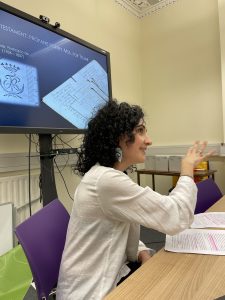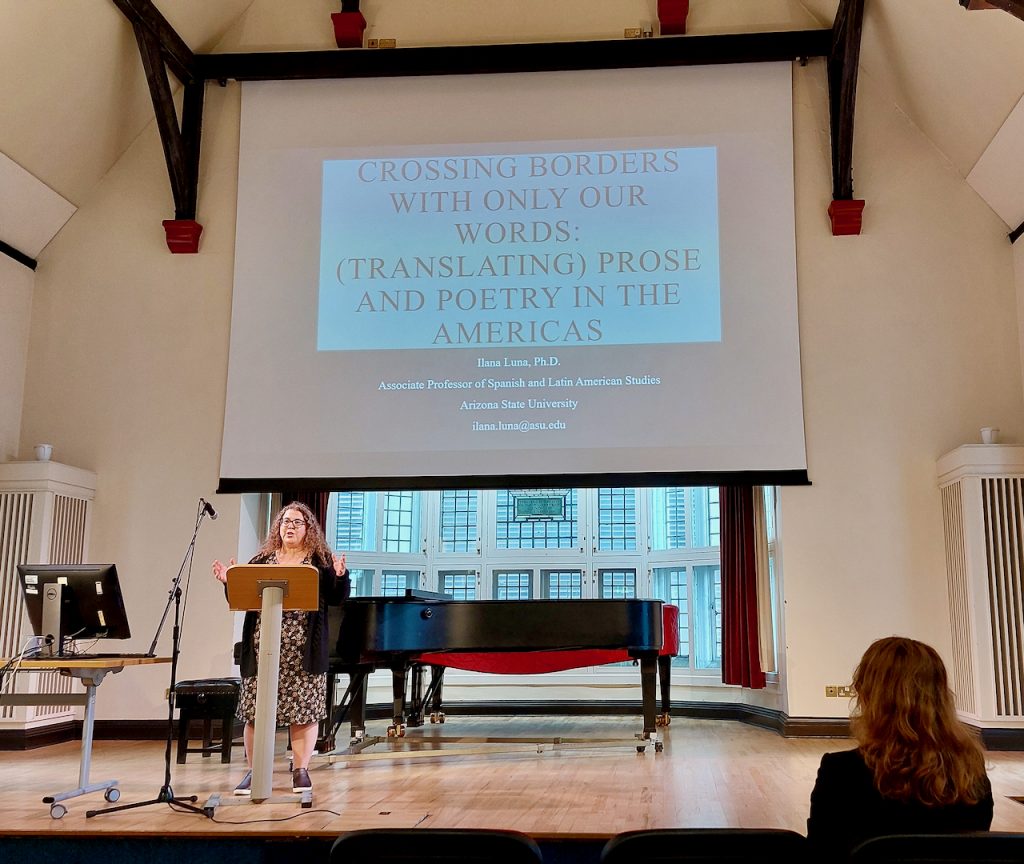Tá an phostáil seo mar chuid dár Scéim Tionscnaimh Taighde do 2024-2025.
This post is part of our Research Initiation Scheme for 2024-2025.
[ENGLISH TEXT ALTERNATES WITH IRISH TEXT BELOW]
Inis dom faoi d’aistear leis an Ghaeilge go dtí seo, conas a d’fhoghlaim tú í den chéad uair agus cén fáth gur phioc tú an Ghaeilge mar ábhar ollscoile?

D’fhreastail mé ar mo bhunscoil áitiúil, mar sin thosaigh mé ag foghlaim na Gaeilge nuair a bhí mé ceithre bliana d’aois. Is dócha go bhfuil sé níos fusa teanga a fhoghlaim ar an bhealach sin, nuair a bhíonn tú óg bíonn tú in ann teanga a phiocadh suas go gasta agus ní bhíonn ort dua a chaitheamh lena foghlaim. D’fhreastail mé ar shruth na Gaeilge i gColáiste Chaitríona, Ard Mhacha ina dhiaidh sin, bhí mé in ann staidéar a dhéanamh ar ábhair trí mheán na Gaeilge agus chuidigh sin go mór liom mo chuid scileanna scríbhneoireachta a fhorbairt. Bhí mé iontach paiseanta faoin teanga agus d’éirigh go maith liom sa Ghaeilge ar scoil ach nuair a chríochnaigh mé ar an scoil ní raibh mé cinnte cén sórt post a ba mhaith liom.
Tell me about your journey with the Irish language so far. How you first learned the language and why you chose Irish as a university subject?
I attended my local Irish-medium primary school, which meant that I started learning Irish when I was four years old. I was the first in my family to learn Irish and it was seen as a bit of a risk sending me there as the school had just been established a year earlier, in 2003. But my mother is a teacher and she was very aware of the benefits of bilingualism and the effectiveness of immersive education. I think it was a lot easier for us to learn Irish as children as we were able to pick it up very quickly simply by interacting with our teachers.
I then attended an Irish-medium stream in my secondary school and I was able to do most of my subjects in Irish. I think that writing essays in subjects like history in Irish really helped develop my writing skills. I have always loved the Irish language and it was definitely my favourite subject in school, especially when we started to study poetry. When I finished secondary school, I didn’t know what sort of job I wanted but I knew I wanted to do something with Irish.
Cén t-ábhar dochtúireachta atá idir lámha agat agus cén fáth ar roghnaigh tú an t-ábhar sin?
Tá mé ag caitheamh súil ar an dóigh a dtéann scríbhneoirí na Gaeilge i ngleic le ceisteanna a bhfuil stiogma agus náire ag baint leo. Bím ag plé leis na teicnící éagsúla a bhíonn in úsáid ag scríbhneoirí chun dul i ngleic le ceisteanna cigilteacha ar nós na gnéasachta agus an mheabhairghalar, mar shampla. Díríonn mo chuid taighde ar na straitéisí cosanta éagsúla a mbaintear úsáid astu chun dul i ngleic le hábhair a bheadh róchigilteach aghaidh a thabhairt go díreach orthu.
Bhí suim agam i gcónaí san fhilíocht agus scríobh mé mo thráchtas bunchéime ar fhilíocht Greagóir Uí Dhúill agus thaitin an taighde go mór liom. Nuair a scríobh mé mo thráchtas máistreachta ar shaothar Dhairena Ní Chinnéide, d’éirigh mé níos muiníní mar thaighdeoir agus bhí a fhios agam go raibh mé ag iarraidh dochtúireacht a dhéanamh. Le linn na máistreachta, chuir mé suim sa smaoineamh go mbíonn feidhm theiripeach i gceist leis an fhilíocht in amanna, agus bhí mé ag iarraidh an cheist sin a chíoradh.
What PhD topic are you working on and why did you choose this topic?
My research looks at how Irish-language writers approach sensitive issues in their work that involve stigma and shame. I focus on the various strategies these writers employ in their work to deal with issues such as mental illness or sexuality, for example. This involves analysing works that use distancing strategies to tackle issues that would be too sensitive to discuss head on.
I was always interested in poetry and I decided to write my undergraduate dissertation on the poetry of Gréagóir Ó Dúill. I really enjoyed the research and when I wrote my Masters dissertation on the poetry of Dairena Ní Chinnéide, I gained a lot of confidence as a researcher and I knew that I wanted to do a PhD. During that masters, I became interested in the therapeutic aspect of poetry and I wanted to do further research on that topic.
Continue reading

